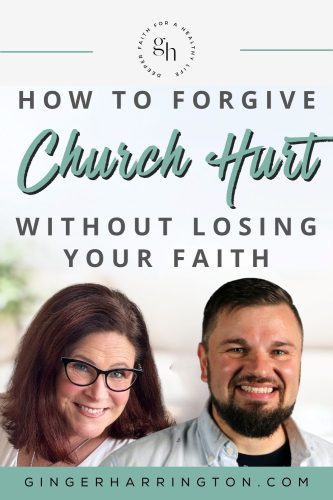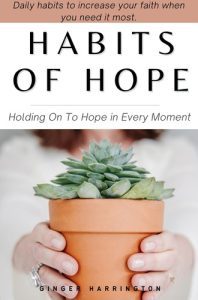Learn how to heal from church hurt with biblical wisdom, Christian conflict resolution, and steps to forgive after betrayal in faith communities.
Have you ever felt hurt by the very people who were supposed to love you well?
Church hurt can leave deep wounds. Whether it’s a personal offense or betrayal by leadership, that pain often feels heavier because it touches the places where we expected to be safe, known, and spiritually nourished.
In this deeply honest conversation with Pastor Mark Cress and Larissa Traquair, we unpack what church hurt is, how to process it biblically, and what healing can look like. We also address one of the most common issues that causes spiritual wounds—gossip.

Understanding the Pain: Two Types of Church Hurt
What Are the Two Main Types of Church Hurt?
Church hurt generally falls into two categories: personal and systemic.
Personal church hurt happens when someone in your faith community wounds you directly—through gossip, judgment, exclusion, or offense.
Systemic church hurt comes from broader patterns within leadership or church culture, such as unhealthy power dynamics, lack of accountability, or an environment where assumptions and accusations replace grace and truth.
Examples of personal hurt:
- Being gossiped about or misjudged
- Feeling excluded or dismissed
- A painful conflict with another believer
Examples of systemic hurt:
- Leadership acting without transparency or accountability
- Gossip and assumptions being tolerated
- A church culture that prioritizes control over care
- Lack of accountability for toxic behavior
- Power imbalances that silence dissent
- Culture that values appearances over truth
“There are two categories of church hurt,” Mark explained. “There’s personal hurt, and there’s systemic hurt. Personal hurt often looks like someone in the church offending or rejecting you. Systemic hurt goes deeper—it feels like betrayal because it often comes from leadership or culture.”
Systemic church hurt can shatter trust. It often causes us to question not only people but our place in the Church itself. And yet, as Mark reminded us:
“The Church may be messy, but it’s still the Bride of Christ. And it’s worth fighting for—with humility and hope.”
The Destructive Power of Gossip in Christian Community
Mark shared that one of the most common sources of church hurt he encounters is gossip. Whether it’s subtle whispering, judgment cloaked as concern, or full-blown slander, gossip damages reputations, divides communities, and violates trust. The pain of being spoken about instead of spoken to often leaves people feeling deeply misunderstood and spiritually unsafe.
“If we would just go directly to the person instead of going around them, we could avoid so much unnecessary hurt.”
Examples of systemic church hurt include:
Systemic church hurt can shatter trust. It often causes us to question not only people but our place in the Church itself. And yet, as Mark reminded us:
“The Church may be messy, but it’s still the Bride of Christ. And it’s worth fighting for—with humility and hope.”
Mark shared that one of the most common sources of church hurt he encounters is gossip. Whether it’s subtle whispering, judgment cloaked as concern, or full-blown slander, gossip damages reputations, divides communities, and violates trust. The pain of being spoken about instead of spoken to often leaves people feeling deeply misunderstood and spiritually unsafe.
Why Isolation Feels Safer—But Slows Your Spiritual Healing
When you’ve been wounded, the natural response is to pull away. You may feel that avoiding people is the only way to protect yourself. But Scripture tells a different story. Mark reminded us:
“There are 59 ‘one another’ commands in the New Testament—and you can’t obey any of them alone.”
Community is hard. But the truth is, healing doesn’t happen in isolation. We need the body of Christ, imperfect as it is, to practice forgiveness, experience support, and continue to grow. Without community, we miss out on the accountability, love, and encouragement that helps us move forward.
Isolation may feel like a shield, but it becomes a wall that blocks healing.
Should You Stay or Leave? How to Discern God’s Direction
One of the most common questions after hurt is this: Should I stay and try to work things out? Or should I leave and find another church?
Mark encourages us to ask this in prayer:
- “Lord, are You calling me to stay and represent You here?”
- “Or are You asking me to leave and find a new place to grow?”
Sometimes staying means doing the hard work of forgiveness and reconciliation. Sometimes leaving is part of setting a healthy boundary. But we need God’s wisdom to discern the difference. Just because it’s hard doesn’t mean it’s time to go. And just because you’re tired doesn’t mean it’s time to stay.
“Ask God if He’s calling you to stay. And if He is, you’ll need the strength to put down the magnifying glass and pick up a mirror.”
That means taking personal responsibility, even when you’re the one who’s been hurt. It means asking, “What part do I need to own?” while still acknowledging the pain others have caused.
The Difference Between Forgiveness and Trust (and Why It Matters)
Forgiveness is central to healing—but it’s not the same as trust. This is where many people get stuck.
“Forgiveness is something you give. Trust is something you rebuild.”
Forgiveness can happen in a moment, but rebuilding trust takes time, consistency, and change. Forgiveness sets you free from bitterness. It opens the door for healing, whether or not the relationship is restored.
“Relationships move at the speed of trust.”
Mark shared that forgiveness is often a daily process. You may choose to forgive, only to wake up the next day and find yourself angry again. That doesn’t mean your forgiveness wasn’t real—it means you’re human.
“I know I’ve forgiven someone when I can pray God’s blessing over them—and actually mean it.”
Forgiveness isn’t about forgetting what happened. It’s about releasing the right to hold it against the person who wronged you.
How to Set Healthy, Biblical Boundaries Without Bitterness
“Boundaries should look more like fences with gates than walls with no openings.”
Forgiveness does not mean giving someone an all-access pass to your life. It’s okay to protect your peace, your space, and your family. Mark reminded us that even after reconciliation, wisdom calls for boundaries.
Jesus modeled boundaries. He often withdrew to quiet places. He didn’t entrust Himself to everyone. He spoke the truth in love, but He didn’t tolerate abuse or manipulation.
“Trust can be broken in an instant, but takes much longer to rebuild.”
Boundaries allow us to forgive fully while still walking wisely.
A Personal Story of Church Hurt, Listening, and Redemption
In one of the most vulnerable parts of the conversation, Mark shared a personal story of being misunderstood and falsely accused by church leadership while walking through a difficult season with his family.
He was trying to hold things together at home while leading a church through the challenges of COVID and personal crisis. His adopted children were dealing with resurfaced trauma. Mark and his wife were exhausted and overwhelmed. Instead of support, they encountered suspicion, gossip, and accusations.
Rather than ask caring questions, leaders made assumptions about Mark’s heart and intentions. They mistook his silence for distance and his burnout for disinterest.
Mark shared this important lesson, “If we would just go directly to the person instead of going around them, we could avoid so much unnecessary hurt. The whole situation could have been different if someone had just said, ‘Are you okay?’ or ‘Is there something going on we can pray for?’”
When Mark learned that multiple meetings had taken place without him—meetings filled with assumptions and criticisms—he knew he needed to respond. He asked for a joint meeting with everyone who had been involved.
Before the meeting, he was warned: If you walk in defensive, this will not end well. That moment was pivotal. Mark realized that his first instinct—to defend, to justify, to explain—might derail the very healing he was praying for.
Instead, he chose humility. He came with a heart to listen.
He sat quietly through harsh words and assumptions. But in time, one of the men in the room finally asked, “What is going on?” Mark shared about his family’s struggles and the emotional toll it had taken. That moment changed everything.
“If I had gone into that meeting defensive, the outcome would have been completely different. People were watching not just what was said, but how it was said.”
Humility, listening, and patience became his path to healing. Over time, the very man who hurt him most became a trusted friend.
“Had it been up to me, I would’ve been gone. But God had a bigger plan.” Instead, he chose to sit quietly and listen, trusting that God would be his defender.
What to Look for in a Healthy Church
If you’re starting over and searching for a new church home, here are some signs Mark recommends:
- Transparent, approachable leadership
- Space for questions and growth
- Healthy boundaries modeled by leadership
- A spirit of grace and truth
- A sense of being welcomed and wanted
- Accountability without shame
- A culture of direct communication, not gossip
A healthy church isn’t perfect. But it is honest, humble, and centered on Christ.
Reflection Questions to Help You Heal from Church Hurt
- Have I been honest with God about my hurt? What do I need to grieve?
- Am I isolating out of protection—or following God’s lead?
- Is there someone I need to forgive—again?
- What does a healthy boundary look like in this situation?
- Have I participated in or been wounded by gossip? What do I need to confess or release?
- What step is God inviting me to take toward healing?
- Who might need a caring question instead of my assumptions?
Encouragement for Your Healing Journey Through Church Conflict
If you’ve been hurt by people in the Church, don’t give up on Jesus because of the people who misrepresented Him. He never mishandles your heart. And He will walk with you through your healing.
“Hurt is going to happen. But hurt doesn’t get the final say. Jesus does.”
You don’t need to have all the answers today. Healing happens one step at a time.
What resonated most with you? Leave a comment, send us a message, or share this episode with a friend who’s walking through something similar.
If gossip, conflict, or broken trust has made you question your place in the Church, know this: there is hope.
You don’t have to carry this alone. With Christ, healing is always possible.

 So glad you're here. I help busy women—gals like you— build healthy habits for living well with biblical wisdom and practical steps to deepen your faith, increase your hope, and thrive in your purpose.
So glad you're here. I help busy women—gals like you— build healthy habits for living well with biblical wisdom and practical steps to deepen your faith, increase your hope, and thrive in your purpose.




I am so GR8TFUL for the blog post to read after listening to the podcast episode. Mark’s examples and practical questions to ask ourselves is so helpful!
Wow!!
Let me start by saying what a great podcast this is, it has been very informative and helpful especially as I’m neurodivergent and mental health issues.
After many tears, thoughts and prayers I have finally had the strength and courage to leave a church due to church hurt (it wasn’t a one off incident) and it took for my mental health to start going downhill for me to leave.
* I had false rumours spread about me and a male person, saying that we were in a romantic relationship when we weren’t.
* I was blocked by at least 3 people on social media for reasons unknown to me and I wasn’t given a chance to apologize or rectify any offences or sins I may have committed (real or imagined) – The people who blocked me were people who barely knew me nor did they ever take the time to get to know me.
* I literally had someone sigh as I was verbalizing a prayer during a prayer meeting.
* I tried to start a Bible study group twice and no one showed up or supported when all I wanted to do is read the Word and fellowship.
* I chose a song at a prayer meeting at someone’s home only to have this group of women hijack it.
* I had people go out somewhere with me only to never do it again, it left me feeling like I was some box to tick for them to get right with God or something.
* I’ve had people completely ignore me at church yet offer me a lift home in order to catch up with me which was confusing to me.
I’m sad, I’m confused, I’m angry, I’m disappointed and all those other bad feelings but now that I’ve left a Christian community that was unsafe, somewhat unsupportive and unwelcoming, and judgmental things are slowly but surely getting better.
Now I’m attending a new church that is kinder, nicer, safer, more supportive and understanding of differences, and less judgmental while still being grounded in truth – The pastor even actively encourages us to read the Bible while he preaches and we sing hymns!!
I also have a new permanent part-time job in aged care I’m, studying disability and community practice at university part-time and I’m even considering singing in a choir again.
I’m good, life is great and God is greater.
Hi Selena,
Thank you so much for taking the time to share your story so openly. I can hear both the deep hurt and the beautiful resilience in your words. It takes an incredible amount of courage to step away from a place that has been wounding you—especially when it’s tied to faith, community, and belonging. I’m so sorry for the false rumors, the exclusion, and the confusing, painful interactions you endured. None of that reflects the heart of Christ for His people, and I know those wounds can cut deep.
At the same time, I’m deeply encouraged by the hope woven into your update. Finding a church family that is kind, grounded in truth, and supportive of your unique gifts is a precious gift from God. I love hearing how He is also opening doors for you in your work, studies, and even in singing again—what a picture of Him restoring joy.
Your story is such a reminder that while people can fail us, God never will. He truly is greater, and He walks with us into safe spaces where we can heal, grow, and thrive. I’m praying your new community continues to be a place of encouragement and that you keep finding joy in the Lord as you serve and worship Him.
Thank you again for trusting us with your journey—you’re not alone, and your testimony will encourage others who are facing similar hurt.